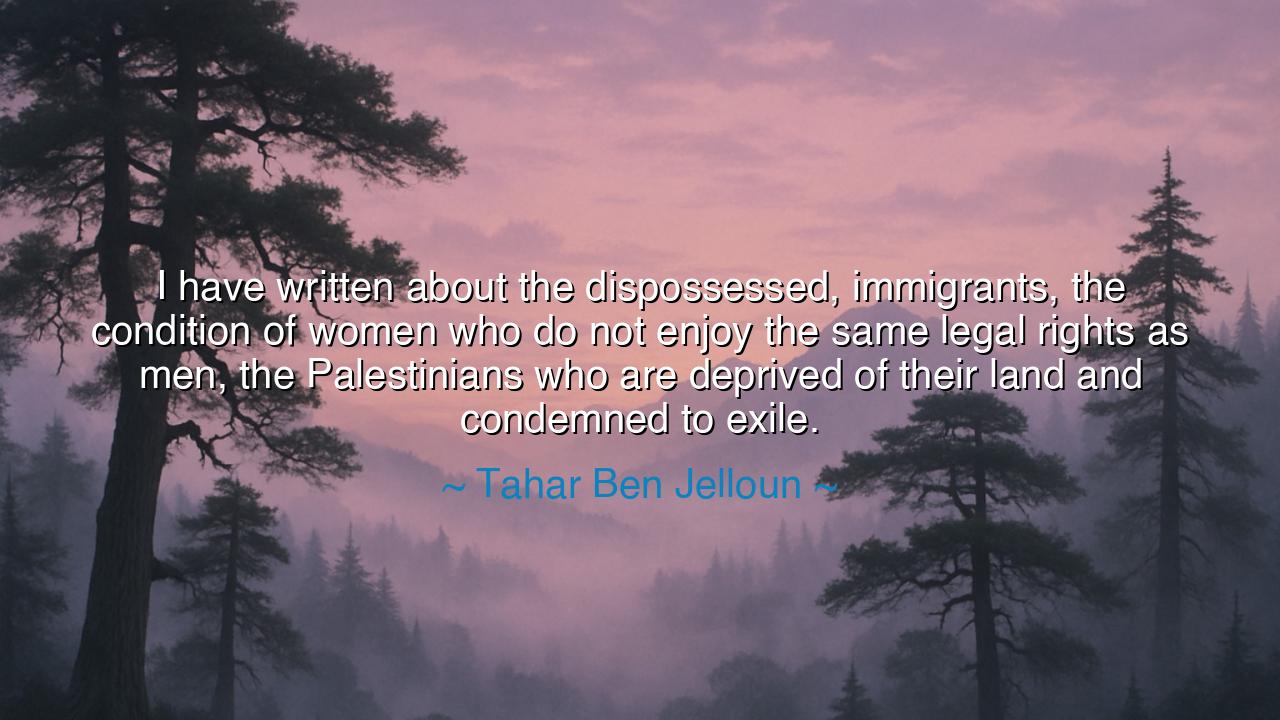
I have written about the dispossessed, immigrants, the condition
I have written about the dispossessed, immigrants, the condition of women who do not enjoy the same legal rights as men, the Palestinians who are deprived of their land and condemned to exile.






When Tahar Ben Jelloun wrote, “I have written about the dispossessed, immigrants, the condition of women who do not enjoy the same legal rights as men, the Palestinians who are deprived of their land and condemned to exile,” he was not merely describing his subjects — he was declaring his moral mission as a writer, a witness, and a guardian of truth. His words carry the solemn gravity of a man who has spent his life giving voice to the silenced, telling the stories of those whom history tries to forget. In his declaration lies the essence of literature’s highest calling: to be the conscience of humanity.
The origin of this quote lies in Ben Jelloun’s lifelong devotion to writing about injustice — particularly within the context of the Arab world, North Africa, and the struggles of migration. Born in Morocco and writing in French, he became a bridge between civilizations — one who exposed the hidden wounds of both East and West. When he speaks of the dispossessed and the immigrants, he speaks as one who has seen borders not merely as lines on a map, but as scars on the soul. He writes of those cast adrift by poverty, war, and exile, searching for dignity in lands that do not call them their own. His empathy is not political — it is human, born from the timeless awareness that civilization itself is judged by how it treats its most vulnerable.
In the condition of women, Ben Jelloun sees another exile — not from land, but from equality. His works often lay bare the unseen chains that bind women in patriarchal societies, where legal rights remain the privilege of men. Like the ancient poets who sang of heroes and battles, Ben Jelloun sings instead of quiet courage — of women who endure injustice with the strength of mountains, who live beneath the shadow of law yet embody the spirit of liberty. He sees in their suffering a reflection of humanity’s unfinished journey toward justice.
His mention of the Palestinians, “deprived of their land and condemned to exile,” adds another layer to his cry for compassion. Here, he invokes one of the deepest wounds of the modern world — a people uprooted, their history fragmented, their dignity bound in perpetual struggle. Yet even in this, Ben Jelloun’s voice does not rage blindly. It mourns with the wisdom of an elder prophet, reminding us that the loss of home is more than the loss of geography — it is the loss of belonging, of identity, of the right to dream without fear. His writing becomes a lament for all who have been dispossessed, a hymn for those who live in exile not only from their homelands, but from justice itself.
To understand his words is to understand that writing itself can be an act of resistance. In ancient times, when rulers silenced truth and prophets were exiled for speaking it, the poet became the last defender of memory. Ben Jelloun stands in that same lineage — like a modern Homer chronicling the odyssey of the marginalized. His pen is his sword, and his compassion, his shield. Through his stories, he redeems the unseen, restoring them to the world’s consciousness, giving them the dignity that indifference has stolen.
There is a lesson here for all who read him: that to remain silent in the face of injustice is to become complicit in it. Every generation must choose whether to look away or to bear witness. Ben Jelloun’s life and work remind us that even when laws fail, when systems collapse, when men turn away from mercy, the truth endures in the hands of those who dare to speak. He teaches that the writer’s role is not to flatter the comfortable, but to comfort the afflicted — to ensure that the cries of the forgotten do not vanish into the wind.
Let his words, then, be carried forward as both warning and wisdom: never forget the dispossessed, never ignore the exile, never deny the dignity of the voiceless. For as long as one person suffers under oppression, the story of humanity remains unfinished. And it is only through compassion, courage, and the relentless pursuit of justice — the very virtues that burn in Ben Jelloun’s words — that the world may one day become whole again.






AAdministratorAdministrator
Welcome, honored guests. Please leave a comment, we will respond soon